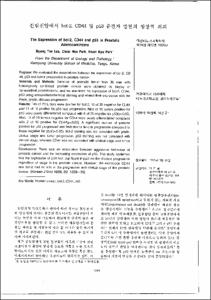전립선암에서 bcl-2, CD44 및 p53 유전자 발현의 임상적 의의
- Keimyung Author(s)
- Park, Choal Hee; Park, Kwan Kyu
- Journal Title
- 대한비뇨기과학회지
- Issued Date
- 1998
- Volume
- 39
- Issue
- 12
- Abstract
- Purpose: We evaluated the associations between the expression of bcl-2, CD44, p53 and tumor progression in prostate cancer. Materials and Methods: Samples of prostatic tissue from 36 men with histologically confirmed prostate cancer were obtained by biopsy or transurethral prostatectomy, and we examined the expression of bcl-2, CD44, p53 using immunohistochemical staining and related their expression with the stage, grade, disease progression. Results: Ten of 23 tumors were positive for bcl-2, 10 of 20 negative for CD44 and 11 of 16 positive for p53 had progression. Nine of 16 tumors positive for p53 were poorly differentiated compared with 6 of 20 negative for p53(p<0.05). Also, 13 of 20 tumors negative for CD44 were poorly differentiated compared with 2 of 16 positive for CD44(p<0.05). A significant number of patients positive for p53 progressed and had shorter time to progression compared to those negative for p53(p<0.05). Bcl-2 staining was not correlated with grade, clinical stage and tumor progression. p53 staining was not correlated with clinical stage,? whereas CD44 was not correlated with clinical stage and tumor progression. Conclusions: There was an association between aggressive behaviour of prostate cancer and the increasing expression of p53. This study confirmed that the expression of p53 had significant impact on the disease progression regardless of stage in the prostate cancer. However, the expression CD44 and bcl-2 had no role in the progression and clinical stage of the prostate cancer.
Key word : Prostate cancer, bcl-2, CD44, p53
- Alternative Title
- The Expression of bcl-2, CD44 and p53 in Prostatic Adenocarcinoma
- Publisher
- School of Medicine
- Citation
- 이병태 et al. (1998). 전립선암에서 bcl-2, CD44 및 p53 유전자 발현의 임상적 의의. 대한비뇨기과학회지, 39(12), 1229–1235.
- Type
- Article
- ISSN
- 2005-6737
- Appears in Collections:
- 1. School of Medicine (의과대학) > Dept. of Pathology (병리학)
1. School of Medicine (의과대학) > Dept. of Urology (비뇨의학)
- 파일 목록
-
-
Download
 oak-bbb-1259.pdf
기타 데이터 / 2.45 MB / Adobe PDF
oak-bbb-1259.pdf
기타 데이터 / 2.45 MB / Adobe PDF
-
Items in Repository are protected by copyright, with all rights reserved, unless otherwise indicated.